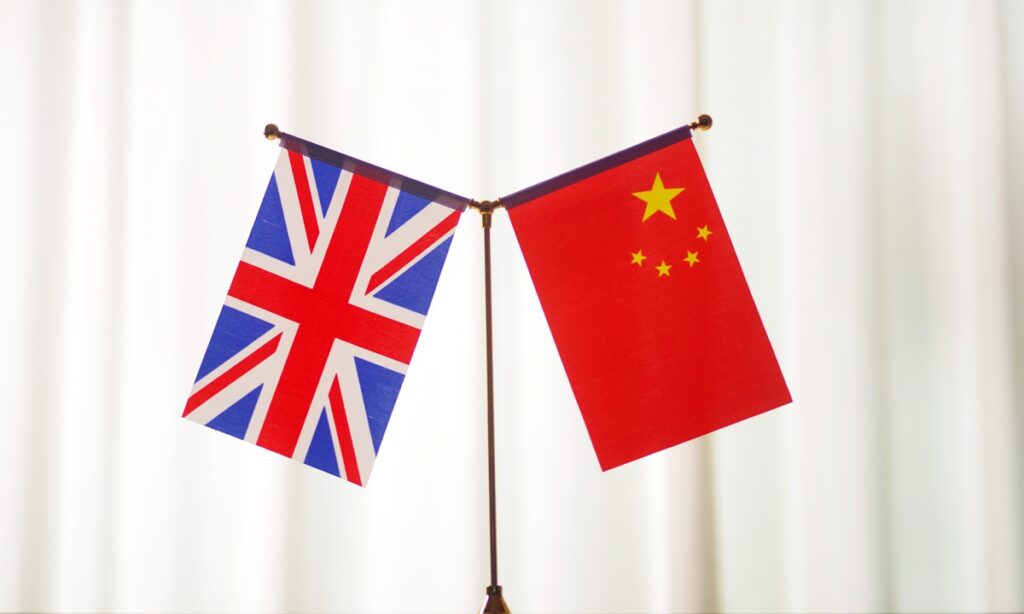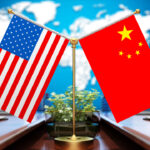China voiced firm opposition on Sunday toward the ongoing visit to the island of Taiwan this week by a “Labor Friends of Taiwan” delegation composed of some Labor members of the House of Lords and MPs, saying the visit is a blatant violation of the one-China principle and serious interference in China’s internal affairs, and the visit also sends a wrong signal to the island’s separatist forces for “Taiwan independence.”
The provocative visit, which came after the UK has accused China of the so-called cyberespionage and criticized China for the recently implemented the Article 23 legislation in Hong Kong as well as the South China Sea issue, is considered another political maneuver that some British politicians have been playing in order to “create bargaining chips” for themselves, and sending out “a chilling effect” for UK-China relations, some experts said.
We express strong condemnation over the visit, a spokesperson of the Chinese Embassy in the UK said in a statement on Sunday. We urge relevant British politicians to stop violating the one-China principle and stop interfering in China’s internal affairs. The relevant British politicians must know that any act that undermines China’s interests will be met with forceful responses, the spokesperson said.
A seven-member delegation led by Lord Sonny Leong, co-chair of the “Labor Friends of Taiwan,” arrived in Taiwan on Saturday. They are scheduled to meet the island’s regional leader Tsai Ing-wen, focusing on the trade and business relations as well as technology innovation between the UK and island, according to local media reports in the island.
The visit also came after the British Foreign Secretary David Cameron warning a Chinese mainland “blockade of the island” would cripple the global economy while British politicians have scripted a big “China threat” farce by alleging that “China state-affiliated actors” are involved in cyberattacks targeting British democratic institutions and lawmakers, after which the UK announced sanctions on Chinese individuals and a company.
“The UK should fully recognize that it lacks the strength and the genuine will to interfere in China’s Taiwan question and the South China Sea affairs, and those [provocative] actions are like scratching an itch through a boot – incapable of posing a real challenge to our core diplomatic interests,” Gao Jian, director of the Center for British Studies at Shanghai International Studies University, told the Global Times on Sunday.
The UK side is also deeply aware that the Taiwan question is the most sensitive red line in China’s foreign policy, and the UK dares not risk its own diplomatic interests to touch China’s diplomatic red lines, Gao said, noting that thus, minor harassing actions can only be seen as meaningless, devoid of any real diplomatic principles and strategies.
While the UK’s approach toward handling UK-China relations centers on three points, including protecting national security, aligning goals with its allies and strengthening collective security, as well as engaging with China for a stable relationship, some Chinese experts said that while it is engaging with China, the UK also believes that the so-called challenges from China are increasingly rising.
“The reason some British politicians are making provocations on the Taiwan question is that they want to create bargaining chips for themselves,” Cui Hongjian, a professor with the Academy of Regional and Global Governance with Beijing Foreign Studies University, told the Global Times on Sunday.
Besides the UK politicians, a delegation from the European Parliament and German Bundestag also visited the island recently, reaffirming their so-called support for the island, according to local media reports.
“The DPP authorities pay an extortionate amount of money to get Western politicians and parliamentarians to visit the island as a means of trying to procure support for separatism,” Tom Fowdy, a British political and international relations analyst, told the Global Times on Sunday.
The fact that the alleged cyberattack happened in 2021 but the “perpetrator” was not named until three years later shows the political timing of the announcement was deliberate and was also coordinated astutely with the British right-wing Conservative aligned press, he noted.
As the UK has been continuously making negative moves that could undermine the UK-China relations, some experts said the bilateral relations will generally be in a rather chilly state this year.
Despite the UK having previously signaled a desire to engage with China, including in the economic and trade fields where they indeed have many needs, the overall stance now doesn’t seem to prioritize diplomacy for the UK, Cui noted.
“Even within the realm of foreign affairs, issues such as the relationship with the US, the Russia-Ukraine conflict, and relations with Europe, might appear more critical to the UK. Therefore, unless something unexpected happens, China-UK relations will remain relatively cold this year,” Cui said.
(Global Times)




